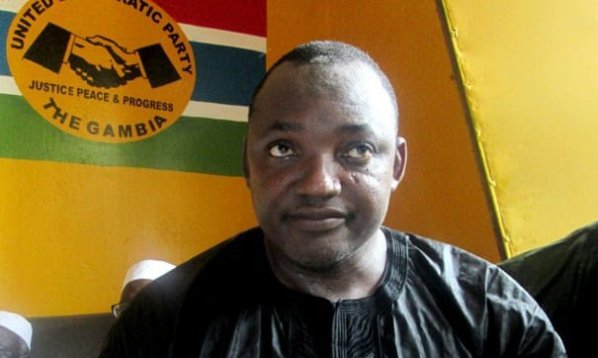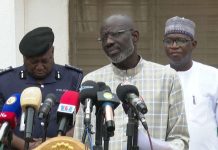Wherever your loyalty lies in politics, I think we can all agree that the recent events in the Gambia’s public services and politics are undesirable, but not surprising because 22 years of brutal dictatorship have destroyed any semblance of normalcy in our civil services. The display of repugnant conduct makesit clear that ethos in The Gambia’s public services is rotten to the core, and show no signs of improvement.
Frankly, it would require a sustained root and branch change to fix the decay that is at the heart of our public services. This, in my view, calls for the government not to dither or engage in blame games, but to take tangible actions and clean up the civil services of malpractices in order to restore the trust and confidence which the public and international partners place in our ability to function as a country.
It is my believe that the future of our public services can no longer remain chained to apologetic approaches of appeasing everyone against accountability for personal failings/wrongdoings, but it must rather lie in the our ability to use penal legislation to punish those who fail to adhere to acceptable standards of professional practices. Misconduct in public office should be criminally prosecuted.
Our insistence to confront bad work practices is a way of circumventing the accountability required to make our public services purposeful. We must do away with approaches that deliberately serve to reinforce irresponsible attitude towards public duty as well as a sense of kingship, and entitlement. I am particularly struck by the attempt of senior public servantsto shutdown public debate about wrongdoing that was reminiscent of the Jammeh years. Is it not the case that no smoke exists without fire? The obligation to clean publicservices lies squarely on the shoulders of those in office at present.
To that end, crying out foul play does not remove suchobligation to do the work the officers are paid to do on our behalf. Thus, the burden remains on them to provide justifiable explanation for their conduct. The notion that public officers are doing us a favour for holding public offices is not only misleading, but an illogical and fanciful thought on the part of the political class. They do not have to accept the posts, do they? No one should be above public accountability. Let it be clear, no one will ever evade public scrutiny in the new Gambia; a public officer is a servant of the people not aking or Mansa. We shall hold their feet to the fire and if they cannot stand the heat, it is up to choose their next move.
Everyone knows that good public services are essential for the promotion of freedom, equality, justice and liberty in furtherance of our democratic values. Thus, public servicescharacterised by malpractices will not only serve as an impediment to the attainment of these fundamental principles,but will imperil any efforts to actualise the objects in our glossy NDP. Surely, turning a blind eye to the unhappy state of affairs would only create a fantasy land of ‘’Gambia no problem’’, whilst the culture of impunity prevails at the expense of our collective good and the viability of the country.
Public duty grows out of a communitarian social philosophy which stresses our contribution in the attainment of collective good. In circumstances where individuals act in such a way that extinguish collective good, I think that there are persuasive and compelling reasons which justify the use of penal law against such reprehensible conduct. It is my strong view that with capable and dynamic leadership, it may be possible to instil acceptable work practices in our public services thereby ensuring that public officers act with integrity and honesty in the execution of public duty. Further, we must redefine public service and recalibrate our priorities in our quest to rebuild the Gambia.
Having considered the current state of affairs in the Gambia, I am of the view that we need a sustained or long lasting attitudinal change, and that change must begin from every household and up the ladder to all institutions. I believe that if such a change is sustainably underpinned by the seven principles of public life, as outlined below, we may see some progress in the Gambia:
1. Selflessness: Public officers should act solely in terms of the public interest.
2. Integrity: Public officers must avoid placing themselves under any obligation to the people or organisations that might try to inappropriately influence them in their work. They should not act or take decisions in order to benefit themselves, their family, or their friends. It should be essential that they declare and resolve any interests and relationships prior to occupying the post.
3. Honesty: Public officers of public office should be truthful; their words must mean something.
4. Objectivity: Public officers must realise that their actions and the decisions they take are impartial, fair and based on merit. In so doing, their decisions and actions must be free from discrimination or bias.
Now Read This: Gambia: Halifa Sallah And Many Gambian Intellectuals Should Apologize To Gambian People For Their Roles In Early Days Of 1994 Military Coup
5. Accountability: Public officers are accountable to the public for their decisions and actions and must submit themselves to the scrutiny necessary to ensure this. In other words, they must realise that the public has an unchallengeable right to criticise them and some critics shall do the criticising whether they approve of it or not.
6. Openness: Public officers should act and take decisions in an open and transparent manner. Information should not be withheld from the public unless there are clear and lawful reasons for doing so and such reasons much be clearly and openly communicated to the public.
7. Leadership: Public officers should exhibit exemplary leadership qualities in their actions and behaviour. They should actively promote and robustly support the principles of leadership and seek to find the key to performance in the execution of their duties and be willing to challenge poor behaviour and performance wherever it occurs.
The bleak picture of the Gambia’s public service represents a deficiency in ethical responsibility. If we are very serious about pulling the Gambia out of the woods, it is important that we change our mind-set and perform public duties with honesty and integrity.
Solomon Demba






